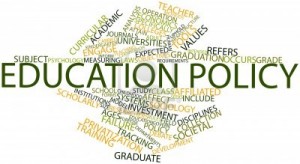 Education policy is not only the laws and regulations that govern education throughout the United States, but it’s also the collection of ideas that drives this policy to influence change. Reform advocates who pursue careers in education policy work as teachers, counselors, principals and other faculty of schools at all grade levels. Some famous examples of education policy initiatives are the No Child Left Behind Act, Family Educational Rights and Privacy Act, Individuals With Disabilities Education Act and the Higher Education Act. Education policy activists have been at the forefront of education reform since the Civil Rights Movement of the 1960s.
Education policy is not only the laws and regulations that govern education throughout the United States, but it’s also the collection of ideas that drives this policy to influence change. Reform advocates who pursue careers in education policy work as teachers, counselors, principals and other faculty of schools at all grade levels. Some famous examples of education policy initiatives are the No Child Left Behind Act, Family Educational Rights and Privacy Act, Individuals With Disabilities Education Act and the Higher Education Act. Education policy activists have been at the forefront of education reform since the Civil Rights Movement of the 1960s.
Educators who want to specialize in education policy can get a master’s degree in Education Policy and Management (EPM) to gain a better understanding of the challenges facing the education system. People who enter this field typically have great passion for educational reform, civil rights, equal education opportunities and politics and government. Another purpose of this field is to analyze education policy in a scholarly capacity. The academic and activist aspects of education policy are closely related, and a degree in this subject thoroughly covers both parts.
History of Education Policy
According to the Department of Education, some of the earliest legislation to arise from education policy initiatives is the Race and National Origin Discrimination Act of 1964. This regulation is an amendment to the broader document that makes up the Civil Rights Act. Another key piece of legislation from early in the history of education policy is the Sex Discrimination Act, an addendum to the Education Amendments of 1972. Later in the 1970s, Congress passed the Americans With Disabilities Act, and education policy advocates succeeded in adding a clause to that document to protect disabled students.
More recent legislation includes the No Child Left Behind Act, although many teachers consider this law to be somewhat controversial. Critics say that its cumbersome regulations prevent students from learning anything of value. Some of the more day-to-day policy initiatives focus on school size, teacher certification, classroom size, teaching methods, graduation requirements and the values taught to students. Education policy extends to all areas of the education system, from preschool to post-secondary school.
How to Become Involved in Education Policy
As an undergraduate, you can major in any subject, but if you already know you want to go into education policy, you can simply major in education. After graduation, apply to enroll in a master’s or doctoral program and begin working toward your post-graduate degree. With a master’s degree in education policy or education research, you can begin gaining experience in university research, non-profit companies, think tanks, academic publishing or government agencies.
If you plan to get a Ph.D in this field, you can skip the master’s degree as it’s a terminal degree and doesn’t lead to a Ph.D While studying for your degree, consider how you would like to make an impact, and position yourself to get your foot in the door after graduating. For example, if you want to be actively involved in forming legislation, work in federal, state or local government. If you would prefer to do research, find a position at a university or non-profit institution.
Related Resource: Education Internships
The education sector is one part of the U.S. economy that continues to thrive, and it needs passionate people to lead in the right direction. If you truly care about making sure every student has the same opportunities for achievement, consider going into education policy as a career.
Be the first to comment